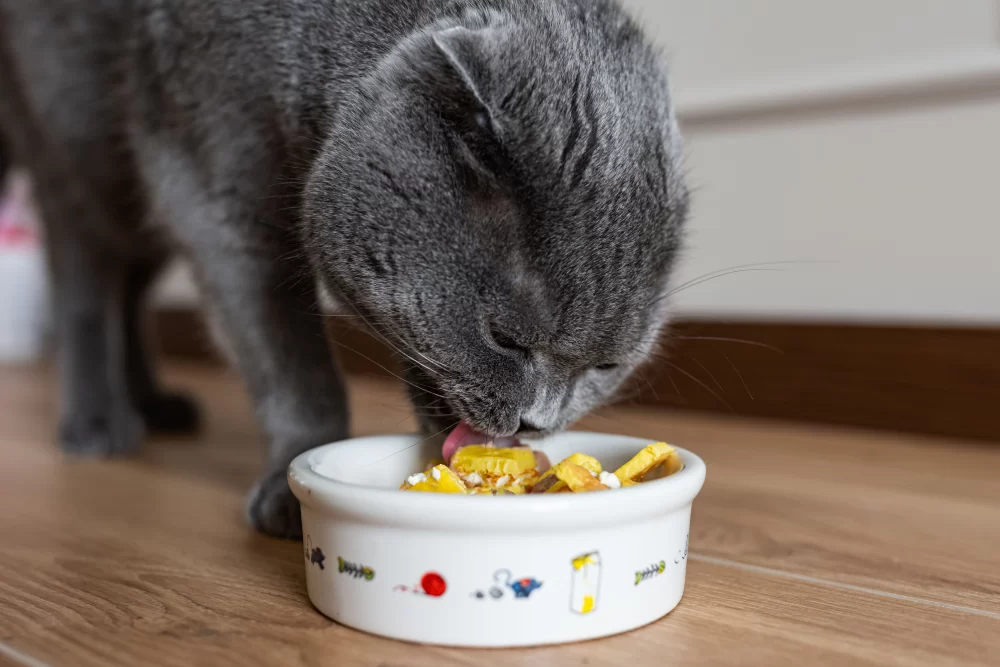- Importance-of-Balanced-Nutrition-for-Kittens
- Essential-Ingredients-for-Homemade-Kitten-Food
- Step-by-Step-Guide-to-Making-Homemade-Cat-Food-for-Kittens
- Common-Mistakes-to-Avoid-When-Feeding-Kittens-Homemade-Food
- Real-Stories-from-Owners-Who-Switched-to-Homemade-Kitten-Food
- How-Hidden-Brook-Veterinary-Can-Support-Your-Kitten-s-Diet
1. Importance of Balanced Nutrition for Kittens
Proper nutrition during a kitten’s early months is critical for healthy growth and development. Kittens require a diet rich in proteins, fats, vitamins, and minerals to support their rapid growth, strong bones, and developing immune systems. Homemade cat food for kittens can provide this balance if carefully prepared, ensuring they receive high-quality nutrients tailored to their needs.
1.1 Growth Demands and Nutrient Requirements
Kittens grow quickly and need more calories per pound of body weight than adult cats. Essential nutrients like taurine, arginine, and omega-3 fatty acids play vital roles in brain development, vision, and cardiac health. A well-balanced homemade diet addresses these demands with natural ingredients.
1.2 Advantages of Homemade Diets
Feeding kittens homemade food allows pet owners to avoid fillers, artificial preservatives, and allergens often found in commercial products. It also provides control over ingredient quality and portion sizes, which is especially important for kittens with sensitivities or special dietary needs.
2. Essential Ingredients for Homemade Kitten Food
To ensure a balanced homemade diet, selecting the right ingredients is paramount.
2.1 High-Quality Proteins
Protein is the cornerstone of kitten nutrition. Ingredients like chicken, turkey, lean beef, and fish provide necessary amino acids. Organ meats such as liver and heart add vital vitamins and minerals but should be used in moderation.
2.2 Healthy Fats and Fatty Acids
Fats supply energy and support skin and coat health. Sources like fish oil or flaxseed oil can enrich homemade meals with omega-3 and omega-6 fatty acids, which are crucial for development.
2.3 Vitamins and Minerals
Calcium and phosphorus are necessary for strong bones and teeth. Including eggshell powder or commercial supplements helps balance mineral content. Vitamin A and taurine supplements ensure that kittens avoid deficiencies that could cause severe health problems.
3. Step-by-Step Guide to Making Homemade Cat Food for Kittens
Here is a basic recipe and preparation method to get started safely with homemade kitten food.
3.1 Ingredients
200g cooked chicken breast (shredded), 50g cooked liver, 1 boiled egg (including yolk), 1 tsp fish oil, 1/4 tsp calcium powder, a handful of steamed carrots or pumpkin (optional).
3.2 Preparation
Combine all ingredients in a blender or food processor and pulse until the mixture forms a smooth, slightly chunky consistency suitable for kittens. Serve fresh and store leftovers in the refrigerator for up to three days.
3.3 Feeding Guidelines
Feed kittens small portions several times a day, gradually adjusting amounts as they grow. Fresh water should always be available to keep kittens hydrated.
4. Common Mistakes to Avoid When Feeding Kittens Homemade Food
Even the best intentions can lead to nutritional imbalances if care isn’t taken.
4.1 Skipping Essential Supplements
Homemade diets may lack certain nutrients vital for kittens, such as taurine. Consulting a veterinarian to include appropriate supplements is crucial.
4.2 Overfeeding or Underfeeding
Portion control matters. Overfeeding can lead to obesity, while underfeeding might stunt growth. Regular weight checks help maintain appropriate feeding volumes.
4.3 Using Unsafe Ingredients
Certain foods, including onions, garlic, chocolate, and some dairy products, can be toxic to kittens. Always research ingredients thoroughly before inclusion.
5. Real Stories from Owners Who Switched to Homemade Kitten Food
Personal accounts illustrate the benefits and considerations of homemade diets.
5.1 Lily’s Journey to Better Health
Lily’s kitten struggled with digestion issues on commercial food. After transitioning to a balanced homemade diet recommended by Hidden Brook Veterinary, her digestive health improved, and she gained energy and a shiny coat.
5.2 Tom’s Commitment to Natural Feeding
Tom prefers homemade meals for his kittens to avoid preservatives. He credits Hidden Brook Veterinary’s nutritional guidance for helping him create safe, tasty recipes that support his kittens’ wellbeing.
6. How Hidden Brook Veterinary Can Support Your Kitten’s Diet
Hidden Brook Veterinary provides expert advice on creating balanced homemade cat food for kittens. Their knowledgeable team can assist with recipe formulation, supplement recommendations, and monitoring your kitten’s growth to ensure optimal health.
For personalized guidance and access to high-quality ingredients and supplements, visit Hidden Brook Veterinary. Their support helps you provide the best nutrition for your growing kitten.












